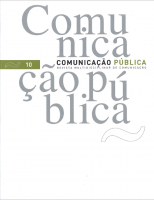From the Stockholm Accords to communicative equations
a fresh look to public relations role in network organizations
DOI:
https://doi.org/10.4000/cp.416Palavras-chave:
stakeholder management, network analysis, communicative equations, public relations, Stockholm Accords, communicationResumo
Everyday in mainstream and specialized media we find references to the many changes that network society is provoking across different sectors, changing values, reshaping professions, etc. Public Relations is not exempt from this impact.
This is one of the starting points for the Stockholm Accords approved at the worldwide assembly of PR professional associations present at the Global Alliance’s World Public Relations Forum in Stockholm, Sweden, in June 2010.
The accords sustain that PR concepts and practices need to evolve in order to be relevant in the new reality of network society and network organizations and they suggest that PR is more likely to evolve into a discipline whose strategic value lies in the facilitation of an effective governance of stakeholder relationships and in helping manage the new reality of “communicative organizations”.
In this article I will try to conceptualize the idea of a ‘communicative equation’, understood as a basic dilemma PR professionals deal with in their daily work. In the network society, it’s not possible to sustain the traditional vision of stakeholders and issues as discrete concepts without carefully considering their dynamic inter relationships. The ‘communicative equation’ helps understand the interconnectedness between interests, problems, agendas, communicative behaviours and communicative groups, thus providing a strategic ability to design resilient and network friendly strategies.
Downloads
Referências
Baran, Paul (1964) “On Distributed Communications: Introduction to Distributed Communications Network”, Rand Corporation Research Memoranda RM-3420-PR, available on line at http://www.rand.org/publications/RM/RM3420/ DOI : 10.7249/RM3420
Becht, Marco, Bolton, Patrick and Röell, Ailsa A.,(2002) Corporate Governance and Control, ECGI - Finance Working Paper No. 02/2002. Available at SSRN: http://ssrn.com/abstract=343461 or doi:10.2139/ssrn.343461
Dandi, R.; Samarra, A (2009) “Social Network Analysis: A New Perspective for the Post-Fordist Organization”, Paper presented at The 6th Conference on Applications of Social Network Analysis (ASNA 2009) August 27-28, University of Zurich / ETH Zurich
Freeman, R. Edward; McVea, John (2001) “A Stakeholder Approach to Strategic Management” Darden Business School Working Paper No. 01-02. Available at SSRN: http://ssrn.com/abstract=263511 or doi:10.2139/ssrn.263511
Grossi, Ignacio (2003) “Stakeholder Analysis in the context of the lean enterprise”, Master’s Thesis presented at the Massachusetts Institute of Technology and consulted on-line in 28/08/07 at http://ocw.mit.edu/NR/rdonlyres/Aeronautics-and-Astronautics/16-852JFall-2005/7828B973-ACB7-4B4D-BD83-10D0AC11A267/0/grossi_thesis.pdf
Kruckeberg, Dean (1998) “ A Revisitation of the concept of Community in Public Relations Practice in the 21st century” Paper presented at the Annual Meeting of the National Communication Association (84th New York, NY) November 21-24 1998
Kruckeberg, D; Stark, K (1988) Public Relations and Community: A Reconstructed Theory. New York: Praeger.
Murphy, Priscilla (1991) “The Limits of Symmetry: A Game Theory Approach to Symmetric and Asymmetric Public Relations”. Journal of Public Relations Research, Volume 3, Issue 1 - 4 January 1991 , pages 115 – 131. New York: Routledge DOI : 10.1207/s1532754xjprr0301-4_5
Phillips, R., Freeman, R. E., & Wicks, A. C. (2003). “What stakeholder theory is not”. Business Ethics Quarterly 13(4), 479–502. DOI : 10.5840/beq200313434
Post J. ; Sachs, S.; Preston, L. (2002) Redefining the Corporation: Stakeholder Management and Organizational Wealth, Stanford, Stanford University Press.
Slevin, James (2000), “The Internet and forms of human association”, in McQuail, Dennis (Ed.) (2002), McQauil’s Reader in Mass Communication Theory, Sage Publications, London
Downloads
Publicado
Edição
Secção
Licença
Direitos de Autor (c) 2011 Copyright (c) 2011 Author

Este trabalho encontra-se publicado com a Licença Internacional Creative Commons Atribuição-NãoComercial 4.0.
Os conteúdos da Comunicação Pública estão licenciados com uma licença Creative Commons - Atribuição-NãoComercial 4.0 Internacional.




